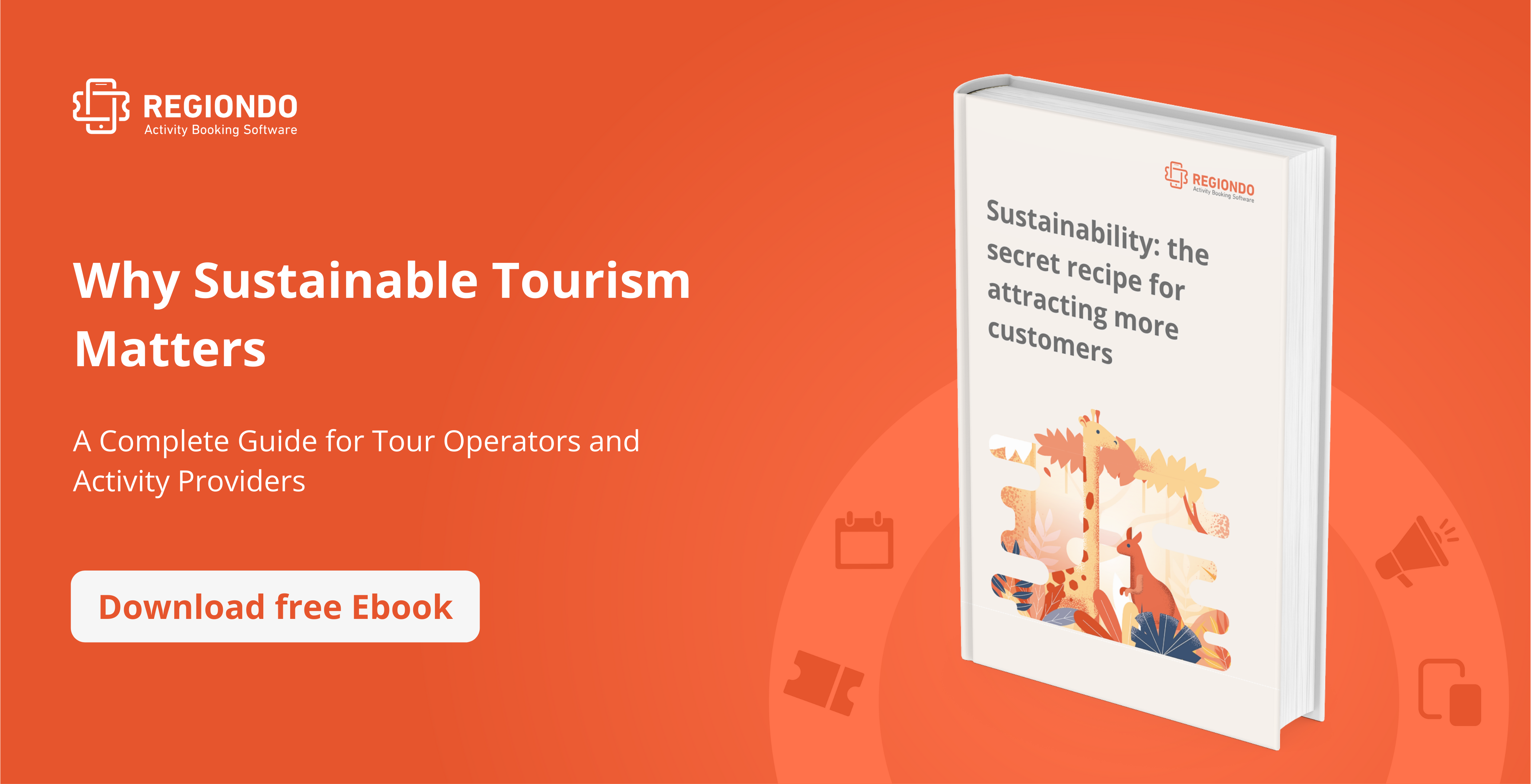Since the dawn of time, humankind has always been moved by the desire to explore its surroundings. Even in our tech-filled age, there’s nothing more rewarding than visiting exotic places, meeting new people, and getting to know foreign cultures. Traveling allows us to get out of our comfort zone and understand that — even if we prefer to think otherwise — we’re incredibly small before nature. It’s an exhilarating yet humbling experience that helps us grow and become our better selves. I’m sure this is a huge reason why you decided to work in the tour and activity business. Thanks to your hard work, thousands of tourists make memories they will remember for a lifetime, and there’s nothing more fulfilling and more important than that.
Learn more about how Regiondo can help you go paperless, get more reservations, and connect with the major OTAs – Click here
We like traveling so much that we tend to underestimate the toll it takes on the lands we visit and the communities they host. It would take a dedicated article (and probably it wouldn’t be enough) to describe all the negative environmental impacts of traveling. Here is a brief list of the most common problems linked to intensive tourism:
- Depletion of local natural resources (especially in places where they’re already scarce). The situation is incredibly concerning regarding the overuse of water, given that tourism accounts for 1% of global water consumption.
- Increase in pollution, including noise and light pollution. According to the latest studies, tourism is responsible for approximately 8% of the world’s carbon emissions.
- Increase in the generation of waste.
- The stress put on the use of local land leads to soil erosion and disruption of the natural habitat, which harms even more already endangered species.
Tourism can also have detrimental economic and sociocultural repercussions. For example, in the most popular tourist locations, the cost of living can increase dramatically, particularly when it comes to rental rates and real estate prices. This can make it difficult for locals, and even more so for workers in the leisure industry, to buy or rent properties.
Thankfully during the last few years, an increasing number of people have become aware of the necessity to adopt a more responsible approach to traveling. Sustainable tourism is one of the trends that will shape the future of our industry in 2023, and there’s no going back. But what do we mean precisely by “sustainable tourism”? Why should tour and activity providers care about sustainability? And more importantly, what are the most effective strategies to make your business green-friendly? In this article, I’ll give a detailed answer to all the questions you might have on this topic.

What is sustainable tourism?
Sustainable tourism is a broad concept that covers the travel experience in its entirety; so, it can be tricky to provide a comprehensive yet clear definition. The World Tourism Organization describes it as “Tourism that takes full account of its current and future economic, social and environmental impacts, addressing the needs of visitors, the industry, the environment, and host communities.” For UNESCO — the United Nations agency dedicated to promoting education, sciences, and culture — sustainable tourism can be seen as “tourism that respects both local people and the traveler, cultural heritage and the environment.”
Expedia — the famous online travel agency — in the 2022 edition of its sustainable travel study, asked 11,000 consumers from all over the world to list what they believe are the most significant aspects of sustainable tourism. The four top answers were:
- Lessening environmental impacts
- Supporting local economies
- Supporting local cultures and communities
- Visiting lesser-known destinations
In general, sustainable tourism is about being mindful of the destructive impact tourism can have, minimizing it as much as possible, and repairing the harm caused in the past.
Why should tour and activity providers care about sustainability?
As the climate crisis unfolds, it goes without saying that working to implement more sustainable practices in the tourism industry is important from a moral standpoint. What most tour and activity providers ignore is that a green-friendly approach can also be beneficial from a business perspective. Below, you can find a series of statistics from the Expedia study mentioned above and the Sustainable Travel Report 2022 by Booking.com, clearly showing that there’s a huge market for companies catering to eco-travelers:
- 90% of consumers already look for sustainable options when traveling, with four out of five customers confirming that sustainable tourism is a topic they care about.
- Travelers’ preferences have already shifted toward favoring more sustainable options. Three in five respondents to the Expedia survey claim they have effectively opted for more environmentally friendly means of transportation or lodging while traveling during the last couple of years (2021-2022).
- Refusing to embrace the green revolution will not only make it challenging to acquire new customers but could also antagonize your existing ones, and faking your commitment is not an option. In fact, over the last two years, 70% of consumers have avoided a travel destination or a transportation option because they were skeptical about the effectiveness of their sustainability practices.
- Ecologically conscious travelers are usually high spenders. On average, these consumers are willing to pay up to 38% more to curb the environmental impact of their travels. What’s even more interesting is that 53% of the users interviewed by Expedia affirmed they are willing to pay a premium to participate in sustainable tours and activities. 70% of them would also be keen to sacrifice some comfort and amenities to become more sustainable tourists.
- Paying attention to sustainability can also put your business on the map, especially if your business is not located in a popular destination. Over the last twelve months, 27% of consumers have decided to visit some less-known tourist attractions to avoid overcrowding.

Shifting to a more sustainable business model is quite challenging: you can’t just flip a switch and magically become a green-friendly tour and activity provider overnight. It will require plenty of work on your side, and even if you succeed, it can be tricky to communicate your efforts to the public in a clear way.
Today, most consumers feel overwhelmed when starting the process of becoming more conscious travelers. First, travelers have a hard time finding information about actual green practices adopted by tour and activity providers. The lack of a widely accepted green-friendly certification makes the research even harder for those travelers that only have a limited amount of time to conduct their research. Furthermore, even when this information is available, users are not always able to understand at a glance the real-life benefits these measures can have. Last but not least, you need to consider that for every tourist willing to pay more to support green tourism, there’s one that thinks it costs too much to travel in a sustainable way.
To attract eco-minded consumers and efficiently communicate your value proposition, you should craft a marketing strategy inspired by the following principles:
Transparency
Make things easier for your customers, and give them updated and truthful information on all the relevant green policies applied by your company. You can add this information to the descriptions of your experiences or on a dedicated page of your official website.
Clarity
Describe your sustainable initiatives with clear and concise language, avoiding any industry-specific jargon. If you have a green certification, proudly show it on your website, especially on your product pages.
Rewarding the end-user
Educate your clients about the positive impact of choosing an eco-friendly tour or activity. Another strategy is to give them tools, preferably in the form of dedicated content, to share their sustainability efforts with their peers on social networks. If you want to go the extra mile, you could also gift them a gadget or a small trinket to reward their positive choice.
How to make your tour & activity business more sustainable
As mentioned above, shifting your tour and activity business toward a more sustainable approach will take time and hard work. Right now, you may feel confused and unsure about your next steps. Luckily, we’ve got you covered.
Start from your office
Starting with baby steps is the best way to launch a project that is successful and sustainable in the long run. Take a deep look at your business practices and identify areas where you can reduce your environmental impact. This might include:
- Switch to energy-efficient (led) light bulbs.
- Make a conscious effort to take more advantage of natural light.
- Turn off electronics and unplug chargers when they are not in use to reduce standby power consumption.
- Choose environmentally friendly and non-toxic cleaning products while avoiding disposable ones like paper towels.
- Encourage coworkers to carpool or use public transportation to reduce the environmental impact of commuting.
- When possible, offer the option for employees to work from home, which can reduce both the environmental impact of commuting and energy use in the office.
- Set up recycling bins and ensure employees know how to use them properly. Remember to properly dispose of electronic waste, such as old computers and printers.
- Use energy-efficient appliances and equipment, even better if made from recycled materials.
- Consider offsetting your carbon emissions through carbon credits or other programs.
- Go paperless with an online booking system that allows you to manage reservations and all your administrative tasks.

Support the local community and economy
- Work with local suppliers and vendors to source your materials and services; you could also establish partnerships to offer joint tours or packages. Furthermore, try to highlight local products or crafts during your tour and activity experiences.
- Offer eco-tours or activities that showcase local flora and fauna or that support conservation efforts in the area.
- Partner with local conservation organizations to sustain their efforts, and incorporate their missions into your tours or activities.
- Hire local staff to work on your tours or activities.
- Help your customers be more eco-friendly by providing them with recycling bags. Also, avoid single-use plastics and offer reusable water bottles for sale or rent.
Promote local culture
- Make sure that your tours and activities are culturally sensitive and respect the traditions and customs of the local community. Avoid activities that exploit or disrespect local cultures.
- Encourage your clients to respect local cultures and traditions and inspire them to learn more about local customs.
Conclusions
As we have seen, going green can benefit both the environment and your bottom line. It can seem daunting initially, but if you start from the basics, everything else will come along. Even switching to led light bulbs can make a huge difference: every gesture counts if it helps improve our world. Another good practice is to digitalize your company with a booking system, so you can stop wasting tons of paper.
Regiondo, the all-in-one booking system for tour and activity providers, allows you to easily automate and manage administrative tasks online so you can focus on more business-critical tasks. Schedule a demo today to learn more about how we can help you streamline your operations, connect with the leading OTAs, and sell more online.






